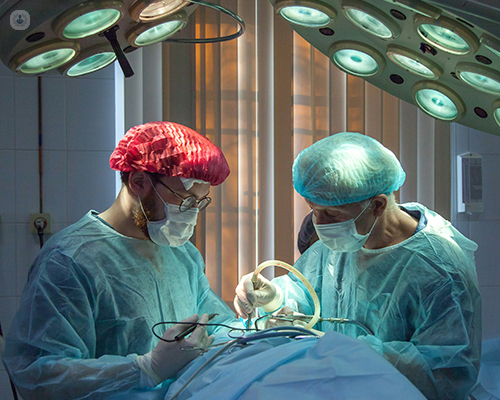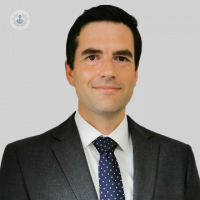Parathyroid gland surgery: what you need to know
Written in association with:Parathyroid gland surgery is a procedure often recommended for patients with certain parathyroid disorders. In this article, we spoke to Mr Andrew Moore, leading consultant ENT head and neck surgeon, who explained what the parathyroid gland does, the conditions that require surgery, and what patients can expect before, during, and after the procedure.

What is the parathyroid gland, and what does it do?
The parathyroid glands are four small, pea-sized glands located in the neck, behind the thyroid gland.
Despite their close location to the thyroid, they have a very different function. The main role of the parathyroid glands is to regulate calcium levels in the blood, which is crucial for various bodily functions, including muscle contraction, nerve function, and bone health.
These glands produce parathyroid hormone (PTH), which helps control the levels of calcium, phosphorus, and vitamin D in the body. When the glands function properly, they ensure a balance of calcium that supports normal bodily operations. However, when they become overactive or diseased, they can disrupt this balance and cause significant health issues.
What conditions might require parathyroid gland surgery?
The most common condition that requires parathyroid gland surgery is hyperparathyroidism, a disorder in which one or more of the parathyroid glands become overactive and produce too much PTH.
This results in elevated blood calcium levels (hypercalcaemia), which can lead to symptoms such as fatigue, depression, bone pain, kidney stones, and osteoporosis.
There are two types of hyperparathyroidism:
-
Primary hyperparathyroidism
This occurs when the glands are overactive due to a benign tumour (adenoma) or, in rare cases, cancer.
-
Secondary hyperparathyroidism
This can develop due to conditions that cause low calcium levels, such as chronic kidney disease.
Parathyroid gland surgery may also be required if the glands are enlarged (parathyroid hyperplasia) or if they form malignant tumours, although cancer of the parathyroid glands is extremely rare.
What are the risks or complications associated with parathyroid gland surgery?
Like all surgical procedures, parathyroid gland surgery comes with certain risks, though serious complications are uncommon.
Possible risks include:
- Damage to the vocal cords: The recurrent laryngeal nerve, which controls the vocal cords, runs close to the parathyroid glands. If this nerve is damaged during surgery, it can lead to hoarseness or changes in voice.
- Hypocalcaemia (low calcium levels): After surgery, patients may experience low calcium levels if the remaining parathyroid glands do not function properly immediately. This can cause tingling or muscle cramps, but is usually temporary and can be managed with calcium supplements.
- Infection or bleeding: As with any surgery, there is a small risk of infection or excessive bleeding at the surgical site. It’s important to discuss these risks with your surgeon so that you fully understand the potential complications and how they will be managed.
How is parathyroid gland surgery performed?
Parathyroid surgery is generally a safe and effective procedure that can be performed using two main approaches: minimally invasive parathyroidectomy or traditional (open) surgery.
The choice of technique depends on the extent of the disease and other individual factors.
Minimally invasive parathyroidectomy
In many cases, the surgery can be performed through a small incision in the neck, allowing for a quicker recovery and less visible scarring. This is often possible when the overactive gland has been clearly identified through preoperative scans.
Traditional open surgery
If the overactive gland cannot be identified before surgery or if multiple glands are affected, a larger incision may be necessary to explore the neck and locate the problematic glands. The surgery typically lasts around one to three hours, and patients are usually able to go home the same day or after an overnight stay.
What can patients expect during recovery from parathyroid gland surgery?
Recovery from parathyroid gland surgery is usually straightforward. Most patients can return to their normal activities within a week. However, it's important to follow your surgeon's advice and avoid strenuous activity or heavy lifting for a few weeks after surgery.
Some common post-surgical symptoms include a sore throat, mild discomfort at the incision site, and temporary changes in voice, which usually resolve within a few days to weeks.
You will be provided with pain relief as needed, and in cases of low calcium levels, temporary calcium supplements may be prescribed. Regular follow-up appointments will be necessary to monitor calcium levels and ensure that the surgery has been successful. In the long term, most patients experience significant relief from their symptoms, with minimal risk of recurrence.
If you would like to book an appointment with Mr Andrew Moore, you can do so via his Top Doctors profile.


